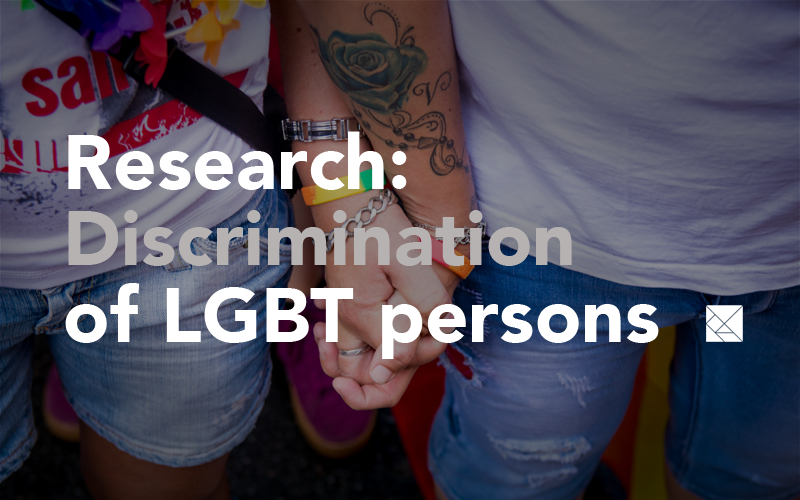
Ombudsman's research: LGBT people suffer discrimination 3x more than general public
Last autumn, the Public Defender of Rights, together with the Prague Pride Association, conducted one of the largest surveys among lesbians, gays, bisexuals and trans people in the Czech Republic. The outcome of the survey was shared on the 17th of May, International Day Against Homophobia, Transphobia and Biphobia. The Ombudsman also added some specific recommendations to various institutions on how to improve the situation of the LGBT community in the Czech Republic.
The questionnaire was mainly focused on problems and obstacles that many LGBT+ people have faced in the past five years, how society accepts them, what social stereotypes and prejudices they have encountered and also on their experience with discrimination and harassment.
Gays and lesbians call for marriage and the society is ready
Gays and lesbians consider the issue of same sex couples sharing their lives together ie. the possibility of getting married and raising children as the most fundamental cause. Making marriage available to same sex couples has a massive support among LGBT+ community with up to 93% of those interviewed. 96% of respondents also expressed beliefs that making marriage and adoptions available to same sex couples would mean a significant improvement in the life and status of a queer individual. They view marriage as a recognition of equality and believe this would gradually weaken a number of other problems related to discrimination, insults or harassment.
A large part of the Czech public shares the same view. According to a previous research by the Ombudsman together with the Prague Pride conducted by MEDIAN company in 2018, 65% of people support gay marriage. Even bigger portion of the population – 71% – would support the possibility of adopting one partners’ biological child into the same sex couple.
Respondents in the research
A total of 2249 respondents have participated in the research, including 1981 lesbians, gays, bisexuals and trans people. Men and women were represented roughly equally (46% each), trans people, or people with transgender or trans sex past experiences to a lesser extent. The age structure was dominated by young people under 25. Based on sexuality, the gays represented the majority of respondents (43%), followed by lesbians (24%) and bisexuals (21%).
Many thanks to all those who filled in our questionnaire.
,,I believe that there should be a thorough evaluation of the importance that the institution of marriage has in lives of gay and lesbian people and consider the possibility of marriage for these couples. Our research has also shown that both gay and lesbians as well as general public are well aware of the legal and symbolic differences between marriage and civil partnerships that make the latter a second-class union,” says Ombudsman Anna Sabatova.
There is plenty of loose ends when it comes to legislation that civil partners have to face. For example, when one of them dies, the other has no entitlement to a widow’s or widower’s pension; a registered partner cannot adopt partner's child. Although they might raise the child together, only one of them has parental rights and responsibility. At the same time, the Council of Europe's Committee of Ministers and the Parliamentary Assembly is in favor of strengthening the rights of parents and children living in "rainbow" families.
What would improve lives of LGBT people in Czechia?
Equal marriage
Prevention of homophobic and transphobic bullying at schools
Stroger support to LGBT by politicians
Diversity strategies at workplace
Position in the society: prejudice, insults and discrimination
Overall, the LGBT+ community tends to recognize that their position in the Czech Republic is rather satisfactory, however not without any problems. They still have to face prejudice, insults and threats. Routinely, they face odd behavioral encounters (people watch them in public, treat them less politely), opinions that they should not be publicly displaying their sexual orientation and prejudice, that homosexuality is unnatural. More than a third of respondents have experienced discrimination in the last five years, which is 3 times higher than the general population.
The vast majority of them, up to 91%, did not address these incidents in any way. The reason behind staying silent would often be that these were trivial incidents that were not worth the hustle of dealing with them, combined with overall skepticism and the belief that reporting these counts of discrimination would not change anything. This downplay does not mean that they are not affected by discrimination or harassment, but rather are used to these situations, which are also usually difficult to prove.
How many respondents do usually hear these typical prejudices:
Homosexuality is not natural
LGB people shouldn't be in public. At home they can do whatever they want.
Homosexualits should be treated by doctors
Homosexual sex should be illegal
Discrimination and harassment happens mainly in schools and at work
Most often, LGBT+ people have to face discrimination or bullying in school or on their daily jobs.
Typically, at school, there are various manifestations of ridicule, threats and bullying between the class mates. However, according to the responders, there were even some instances, where the ridiculing and grossly offensive behavior came from the school staff.
,,It is striking that although schools are supposed to teach young people mutual respect, compassion and tolerance, a significant bit of those interviewed have experienced bullying, discrimination and harassment while visiting a school institution. These institutions should be mindful of the environment that they nurture their students in, rigorously investigating every suspicion of bullying and educate the pupils on sexual minorities. I also suggest that the topic of human sexuality and homophobia become a part of the compulsory pedagogical basis of teacher's education, “says the Ombudsman.
Nearly a quarter of respondents said they often experienced negative attitudes towards LGBT+ people at work. 11% of respondents have experienced discrimination or harassment at work in the past five years.
"Employers should avoid harassment and have an action plan in case sexual orientation or gender identity harassment occurs in the workplace," the Ombudsman said, recommending, among other things, that the State Labor Inspection Office should also methodologically guide labor inspectorates in carrying out controls and investigation of alleged discrimination against LGBT+ employees.
Victims do not report incidents
More than a half of the respondents have encountered harassment in the last 5 years (insults, ridicule), which is slightly more than the Czech Republic's FRA research in 2012. About one in ten respondents have also faced threats and almost the same share of physical or sexual assault. Harassment, threats or violence are usually committed by an unknown adult in a public place (street, square), making it difficult to address such incidents. School, internet, public transport, cafes, restaurants and clubs are also frequent harassment sites.
The vast majority of the LGBT+ citizens did not address these incidents and did not seek any help. Even the most horrifying cases of attacks or threats were reported only by 13% of the victims and when it comes to harassment, only 2% of the victims came forward. "We found out that victims were subsequently trivializing these incidents and did not consider turning to police as a proper solution of the problem. In particular, about a fifth of the responders did not turn to the police because they didn't feel like they could trust them, they were afraid of possible ridicule and their case would not be taken seriously. Other reasons were skepticism and mistrust in the police and their ability to solve such cases.” the Ombudsman summarizes some of the findings. She also suggests that the Ministry of the Interior should make sure that the issues of the LGBT+ community are not ridiculed, taken lightly or dealt with inappropriately.
When it comes to making the justice accessible to the LGBT+ community, the Ombudsman suggests that the Government and the Chamber of Deputies grants LGBT+ individuals the same protection against hate crime as racial, ethnic, national or religious groups have. For example, in discriminatory disputes, adjusting the burden of proof in such a way that it also occurs in the cases of discrimination based on sexual orientation or gender identity, etc.
Examples of reported incidents:
An elderly lady attacked me at the train station for no apparent reason. I note that the only thing I did was giving my partner a hug, but the lady immediately started to scream at us that we were the puns of nature, we should be locked up at home and be ashamed for being alive.
Lesbian, 19 to 25 years old
Me and my partner were commuting by the metro. We were sitting opposite to each other, talking, and when it was my partner’s stop, we kissed goodbye. In the doorway he was verbally attacked by a man who then turned to me and tossed rubbish accompanying his action with the words "fucking fag". I pushed him out of the train to the platform where our encounter got physical. During that I managed to call the Police of the Czech Republic. Before the unit arrived, the attacker ran into another train and took off.
Gay, 19 to 25 years old
My teacher told me that homosexuality is a disease, so I asked him, since it is a disease, how should it be treated. He told me that there is no remedy, except for shooting myself.
Bisexual woman, 13 to 18 years old
When one of the high school teachers found out that I am not a cis male (he saw my report where my name was written under a woman's gender), he came into class and proceed with an announcement about it in front of the whole class. The class then have been asked if they suspected they had such a lying girl in the classroom. He kept forcing me to apologize to everyone. I'm not a boy, but a girl, and he's going to treat me like one. He switched to the feminine pronouns and began to insult me, telling me what a shame I am for society, how I spoil it, what a waste I am. That supposedly I am a sick person who needs treatment, so he told me to get one before I get a chance to reproduce. There was plenty of insults coming from his side. The teacher then has been switched for somebody else, however nothing else happened to him.
Gay, transgender / transsex person, 19-25 years old



